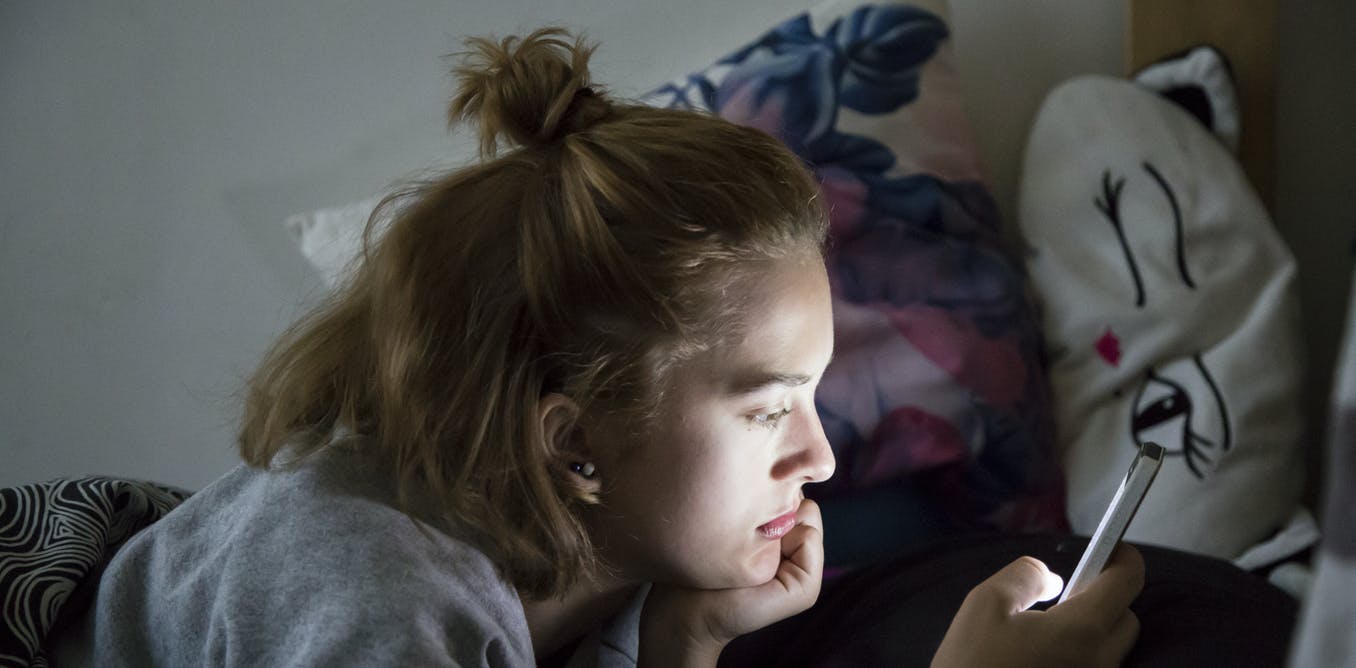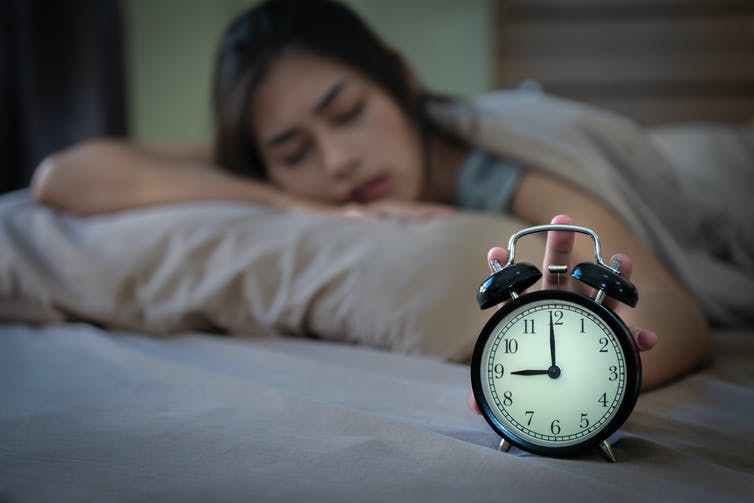Back to school: how to help your teen get enough sleep

Shutterstock
When the holidays end, barring a fresh outbreak of COVID-19, teenagers across Australia will head back to school. Some will bounce out of bed well before the alarm goes off, excited to start a new school year, but many others will drag themselves to the shower or reach for caffeine to shake themselves awake.
Many will not have had enough sleep to tackle the trials and tribulations of their new school day.
Read more:
5 tips to help ease your child back into school mode after the holidays
I remember back to my days as a high school science teacher, when some of my students started falling asleep in class. My immediate thoughts were: have I lost my touch? Am I that boring?
Over-tiredness can also lead to misbehaviour. One of my usually good kids filled a disposable glove with water and hurled it around her head spraying water and ruining the work of other students. An investigation determined a string of very late nights perusing social media and texting friends. It was possible her over-tiredness led to an inability to regulate her behaviour.
How phones close to bed affect sleep
With widespread school closures of 2020, and a reduction of face-to-face contact in 2020, teenagers used mobile phones more frequently to engage with their peers and online learning.
Teenagers need friendship networks to help them cope with stress and foster resilience.
Teens use devices to keep up to date with their friends’ activities on social media, or they may connect with a mate for an online gaming session, or phone a friend. Just like their parents, when teens aren’t connecting with their friends they are likely to use their smartphone like a mini-computer to stream videos and TV, listen to music, shop or catch up on news.
Of concern is that many of these activities occur into the night and in the confines of the teenager’s bedroom. This may not be a worry in the holidays when teens can sleep in but getting enough good quality sleep can be challenging when they have to be somewhere first thing in the morning.
Read more:
Why screen time before bed is bad for children
Unfortunately, the constant use of technology can be at the expense of sleep with many teens missing out regularly on the required 8-10 hours a night.
Using a mobile phone into the night not only displaces sleep. Viewing screen-light also suppresses melatonin (the natural hormone that regulates our sleep-wake cycle), and provides content that may overstimulate the brain.
For teenagers, the pathway from increased late-night screen use leading to disrupted sleep and then contributing to increased depressed mood, behaviour problems, low self-esteem and difficulty coping can become well established.

Purchasing an alarm clock is a good step towards helping regulate your teenager’s sleeping habits.
Shutterstock
Having enough sleep means teenagers brain cells will be alert during the school day. Sleep helps with the ability to think critically, and process and store new information, so teenagers become satisfied with their achievements at school.
Enough sleep also helps ward off daytime sleepiness and provides more energy to participate in vigorous physical exercise — an activity that helps ensure a good night’s sleep in itself.
Helping your teen get a good sleep
The first thing you could do is locate or purchase an alarm clock (with no internet connection). You could then remove devices from the bedroom the night before school starts and set the alarm.
But still, teenagers’ routine of falling asleep late into the night during the holidays isn’t magically going to revert to an early bedtime.
Read more:
Health Check: how can I make it easier to wake up in the morning?
On the first school night teens will probably lie awake (perhaps with heightened anxiety about their first day) and get frustrated. They will finally fall asleep, but be rudely awoken by the alarm. A grumpy start to the new year is to be avoided at all costs.
The message to teenagers and their parents is: understand the need for social connections but set curfews. Beyond setting such curfews on the phone itself, it’s important to remove it from the bedroom 30 minutes to an hour before sleep as wind-down time. Teenagers must learn to manage their own schedules by going to bed at a time that ensures when the alarm goes off they will have achieved between 8 to 10 hours sleep.
Here are some things that could make this easier:
at least a week before school starts, set the alarm 5-10 minutes earlier each day until the school day alarm time is reached
set earlier, regular bedtimes so as not to confuse the body clock
take all electronic devices out of all bedrooms (yes, set an example) and charge them in a place children can’t sneak out and access during the night
avoid caffeine, alcohol, energy drinks and large meals well before bedtime
exercise earlier in the day as this will increase tiredness. Make sure exercise isn’t too close to bedtime as this raises body temperature and increases cortisol (the stress hormone) making it harder for some people to fall asleep
try to get ahead of the problem by having conversations with your child before they reach their teens to make sure they understand the effects of not getting enough sleep
during the holidays, use sleep tracking apps to monitor sleep and set up the bedroom to be conducive to a good night’s sleep (no illuminated power cords, good airflow and a comfortable pillow and bedding).

Lynette Vernon does not work for, consult, own shares in or receive funding from any company or organisation that would benefit from this article, and has disclosed no relevant affiliations beyond their academic appointment.






